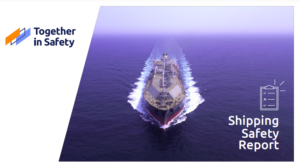Together in Safety, a coalition of 20 major shipping organizations aiming to make shipping safer, has issued its first Shipping Safety Report, including case studies and examples of best practice, which demonstrate the benefits of shared safety learnings and resources.
First proposed at the Global Maritime Forum Annual Summit in 2018, 20 leading shipping organisations, including INTERCARGO, INTERTANK, OCIMF, AMSA, BIMCO, CLIA, Maersk, Carnival, Shell Shipping & Maritime, UK Club and others, unveiled their common ambition to make the maritime industry safer, agreeing 9 Golden Safety Rules on shipping safety, as well as ideas on how they could be implemented and used.
The number of reported shipping casualties or incidents has increased by 5% to 2,815 in 2019 compared to 2018, according to Allianz data. Meanwhile, the current situation, with extended periods onboard and increased uncertainty, sees a greater potential of mental and physical fatigue, an underlying cause of human error estimated to be a contributing factor in 75%-96% of maritime incidents.
With a vision of working together towards a zero-incident future, Together in Safety recognises that there is more that can be achieved in uniting the shipping industry around safety. For the first time, all sectors from across shipping have come together with a common purpose to make a step change in their safety performance.
Under the four guiding principles of Leadership, Accountability, Collaboration, and Care, Together in Safety has compiled a set of safety best practice and learning programmes, which are available free of charge to everyone on the new Together in www.togetherinsafety.info. Specifically:
-Leadership:
- Safety Leadership Behaviours: Modelling the right behaviour and mindset from the top, and building a foundation of strong safety leadership that supports the organisation.
- Leadership Visits: Learning tools that promote the importance of leadership presence and examples of how good engagement with those at the forefront of an organisation’s shipping operations can make a real difference to the safety culture, and be truly transformative when championed from the top of an organisation.
-Accountability:
- Golden Safety Rules: The 9 golden safety rules focus on the work areas known to have a significant impact on safety in the shipping industry. The easy-to-follow rules highlight the key issues within each work area, and give operators a series of dos and don’ts to share with employees and promote safer working practices.
- Safety Learning & Training Resources: Training materials and learning programmes, including modules on reflective learning about incidents and crew engagement tools that have been specifically designed to be run onboard by a ship’s crew. These tools are engaging and easy to use, providing helpful safety awareness reminders for busy operational teams.
-Collaboration:
- Data Utilisation: Gathering and analysing incident data is crucial to enabling the shipping industry to make the step change required. Incident and near-miss data are critical to learning.
- New Data Sharing Tool: An open data platform is relatively new in the maritime industry and has the potential to change the way data is shared. It has proven to be a significant contributor to the improved safety performance in the aviation and rail industries. As part of Together in Safety, a new data platform has been developed and aligned with HiLo, which is an independent company established 3 years ago. HiLo uses predictive risk modelling with incident weak signals to highlight the potential for major shipping incidents before they happen.
-Care:
- Mental Health & Well-Being: Practical, easy-to-follow self-help modules, sharing the steps organisations and individuals can take to promote and improve physical well-being and better understand mental health.
Explore more herebelow:






























































